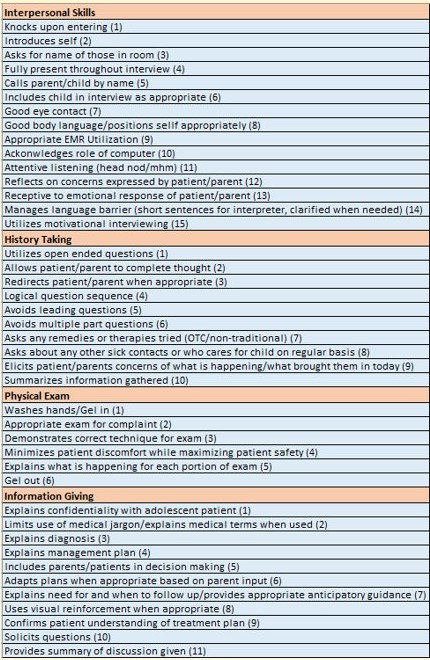Medical Education
Session: Medical Education 8
489 - Effectiveness of Direct Clinical Observations and Feedback For the First Year Pediatric Residents in the Ambulatory Settings: A Cohort Study
Monday, May 6, 2024
9:30 AM - 11:30 AM ET
Poster Number: 489
Publication Number: 489.3124
Publication Number: 489.3124

Joshua Bonville, MD (he/him/his)
Assistant Professor of Pediatrics
SUNY Upstate
Syracuse, New York, United States
Presenting Author(s)
Background: Medical interviewing, interpersonal skills, and examination skills are all important pillars of clinical training. Based on an AAMC group report showing insufficient education in these areas, Lane et al. developed one of the first Structured Clinical Observation (SCO) tools in the 1990s. Our study aimed to create a similar tool and objectively measure improvements with its implementation into our resident curriculum.
Objective: To assess the effectiveness of Direct Clinical Observation (DCO) and feedback by implementing a modified SCO tool for the first-year pediatric residents in the ambulatory settings.
Design/Methods: This was a Cohort Study. A modified SCO tool was used during a DCO. This modified SCO was based on those by Lane et al. 2000 and Hamburger et al. 2011, which included 4 domains of investigation (Interpersonal Skills, History Taking, Physical Exam, Information Giving). A Control Group underwent a DCO in the 2nd half of their intern year. The next academic year, an intervention group underwent a DCO in the 1st half (Pre-Intervention Group) and 2nd half (Post-Intervention Group) of their intern year. Statistical analysis involved calculating the percent of each question completed and calculating the absolute percent change between individual questions and net domain change. Comparisons in the absolute percentage were made between the Control Group vs. Post-Intervention Group and the Pre-Intervention Group vs. Post-Intervention Group.
Results: A positive net domain change was observed in all four domains in the Pre-Intervention Group vs. Post-Intervention Group. In the Control vs. Post-Intervention Group, a positive net domain change was noted for Interpersonal Skills, History Taking, and Physical Exam while a small negative net domain change was noted for Information Giving.
Conclusion(s): Utilization of a SCO tool for DCO provides an objective measure for providing immediate feedback to help enhance clinical education. Our comparison showed overall net improvement between both Control vs. Intervention and Pre vs. Post Intervention Groups. When analyzing domains, Information Giving was the only domain that decreased slightly when comparing Control Vs Post-Intervention Groups, possibly suggesting less usefulness in this domain with the current SCO iteration. Alternatively this could be the natural improvement in the Information Giving ability as residency progresses that is not improved nearly as much as the other domains with DCO. Larger controlled studies would assess the feasibility, effectiveness, and cost-effectiveness for SCO tool use in multiple facets of resident education.

